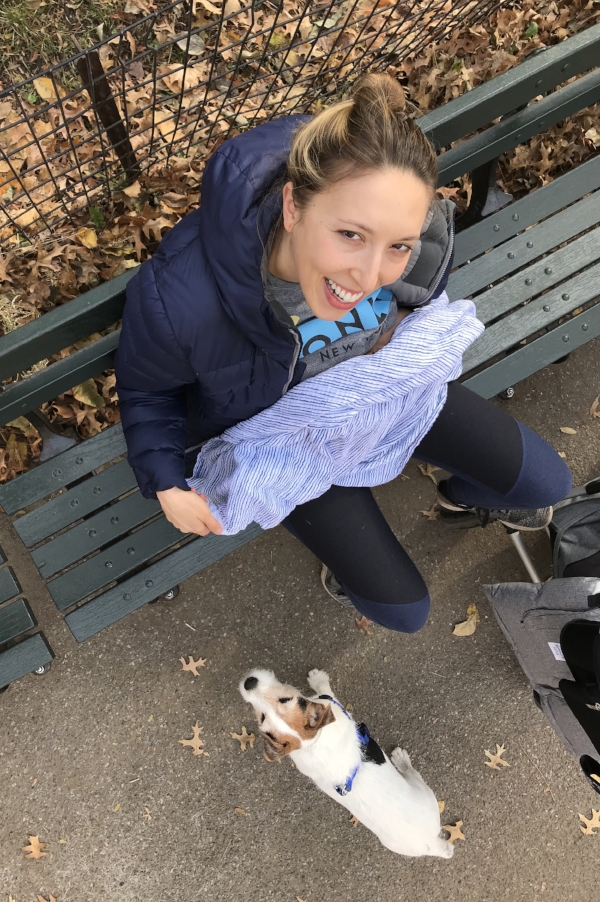Before I was on the "other side" of things, I never realized how consuming breastfeeding is. I always knew that it was something that I hoped to be able to do for the nutritional, immunological, psychological, and environmental benefits. After experiencing the mammoth commitment that breastfeeding is, I understand why many mothers choose to stop before going back to work or decide not to do it at all. I am also fully aware of the many people who would like to be able to and because of certain factors do not have the option. The only way to adequately describe the first three months of breastfeeding is exhausting. At times I would feel completely tethered to Jack and that my days were just spent feeding him. In the "early days", i.e. the first three months, I used an app that allowed me to keep track of Jack's naps and feedings. After 48 hours of recording, I almost had a breakdown when I saw how many hours I had spent breastfeeding. Now at 4 months in, I wish that I had been kinder to myself and to have viewed those early months as a time to heal my body while providing Jack with all the nourishment and the emotional and physical closeness that he needed.
When my milk first came in, I dealt with really painful engorgement and also struggled with getting Jack to latch. I had a postpartum doula and a birth doula, both who helped immensely with support and guidance. My postpartum doula gave me massages, developed a regimen to ease the pain, and assisted me to find the best feeding positions. I had to use a nipple shield for the first week or so, which helped alleviate sore nipples and helped Jack latch on.
When you are breastfeeding, planing your day becomes one step more complicated. If you are doing an activity on your own, making sure that there is enough milk for the caretaker to feed the baby is the first priority. Priority number two is making sure you can pump within a three or four hour window of your last feeding or pumping. Also every time the baby has a bottle, in theory, you need to pump in order to keep your supply up and avoid engorgement and leaking. I learned this the hard way early on.
In the "early" days, this felt quite confining and limiting. I would sometimes push myself, trying to "live my life", but would end up in pain and leaking and be concerned about reducing my supply. Now as I settle into more of a routine and learn this new "normal", I have adapted and still constantly keep that three to four hour rule in my head. When I do get bummed out about it, I tell myself that I am giving my child the best nourishment possible and that this phase will be fleeting.
As a new mom and navigating all things breastfeeding, I remember being confused and overwhelmed about whether my body was going to produce enough milk as well as how would my body adjust once Jack was able to sleep for longer stretches at night. When Jack first start sleeping more and I would wake up engorged and in pain, I pumped in the middle of the night, which was pretty awful. Now that Jack is sleeping 10 to 11 hours, I have a routine of pumping right before I go to bed. Again, not enjoyable, but part of the commitment that I have made to myself and Jack. The benefit of pumping is not only keeping my supply up, but having extra milk that my husband or one of Jack's grandmas can give him while I have "me time".
Gear
I have the Spectra S2Plus model which is great, but, if I were to order one now, I would get this one since it is rechargeable. Most insurance covers the cost of a pump, which is awesome! I also have a pumping bra (which I am not especially attached to so I am not recommending the brand).
The Medela hand pump is what I used for middle of the night pumping sessions as well as some travel.
Dr. Brown bottles are the only ones that I have used since they work well for us.
I have been pretty happy with the nursing bras and tops by Ingrid and Isabel. I resisted getting them for a while, but once I did, I understood how valuable they can be.
I also purchased a Kindle which was a game changer for one handed entertainment during night time feedings.
Nutrition
I try to eat oatmeal with flax regularly and make my lactation bites often. Lactogenic foods or galactagogues possess certain properties which stimulate milk production. Oats, flax, almonds, sesame seeds. fenugreek, and fennel contain phytoestrogens or beta-glucans which help stimulate lactation and assist in producing more milk.
When I was pregnant I started craving more chicken and eggs, so I listened to my body and mindfully integrated them into my diet. I made sure to select the best possible options available which means pasture-raised and organic. Not much has changed while breastfeeding. I noticed that I continue to crave more protein then before I was pregnant, so I am doing my best to give my body what it needs. My other "go-to" protein sources include organic peanut butter, nuts, lots of chickpeas, and quinoa.
Staying adequately hydrated and fueling yourself throughout the day are essential for milk production. I try to drink 16 ounces of water every time I feed Jack. It's certainly not classy, but I usually drink from 24oz mason jars to optimize my hydration during the day. I also drink at least one cup of Mother's Milk tea or Liquid Gold tea daily.
I still take my prenatal vitamins daily along with omega 3's, calcium, vitamin D, and Natural Calm which contains magnesium.
Now that breastfeeding has become second nature and I have become more and more comfortable doing it in public, I hope to be able to keep it up until Jack is one year old.
Did I forget anything? Please write any questions in the comments and I will do my best to get back to you.




